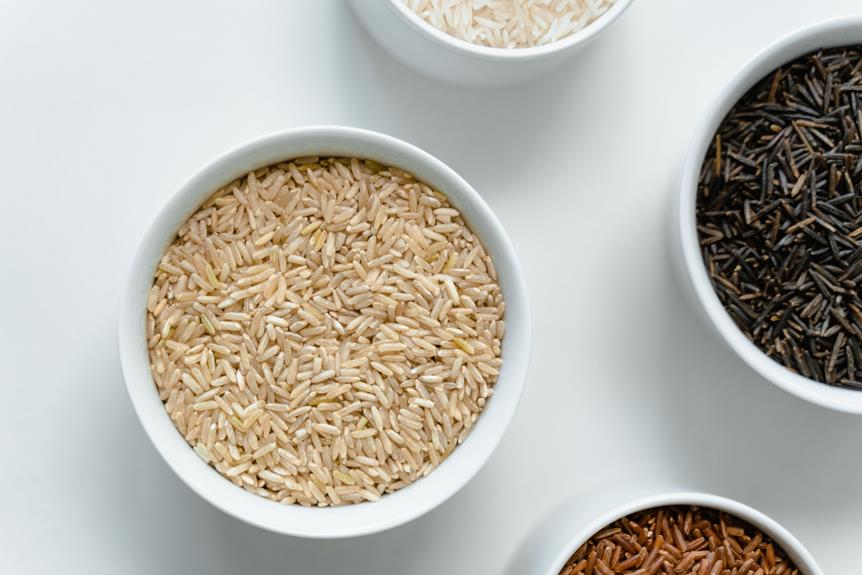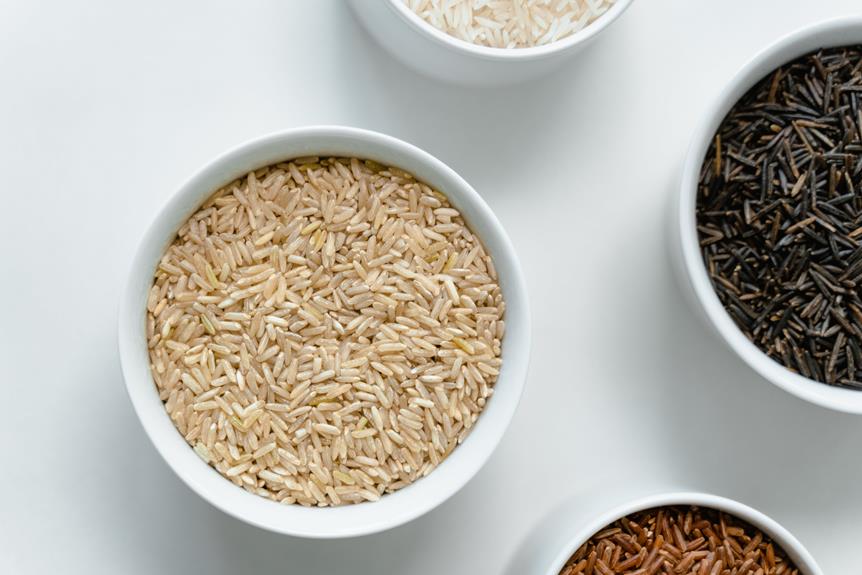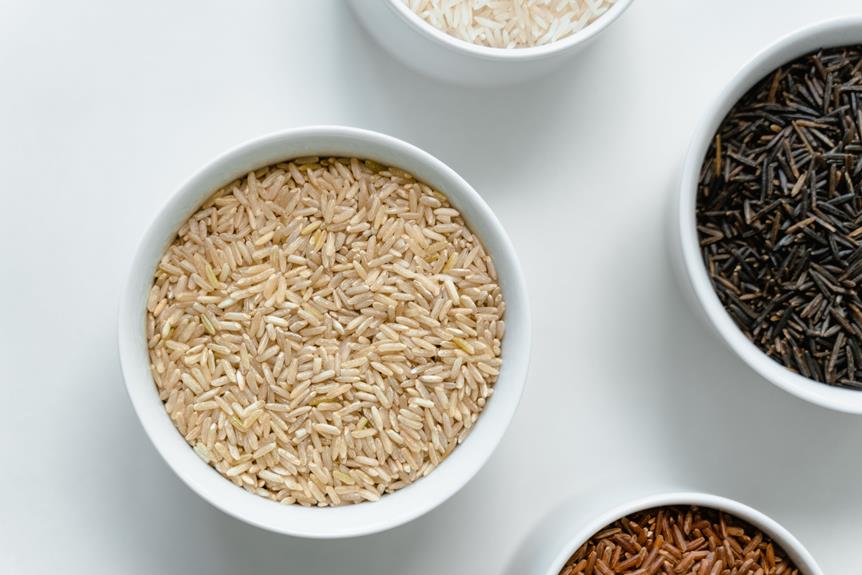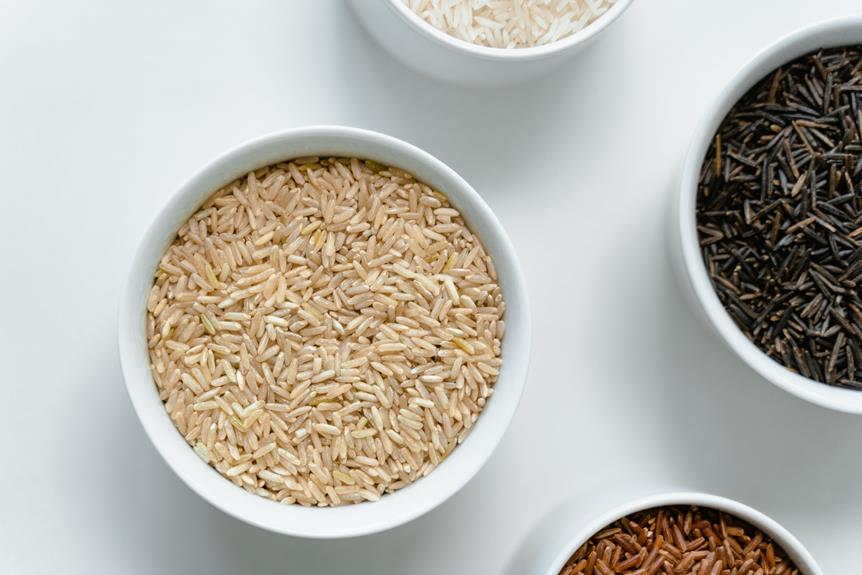It's funny how something as simple as eating the right foods can have such a big impact on your digestive health. But hey, that's the way the cookie crumbles, right? Well, maybe not cookies, but definitely beans and legumes. These fiber powerhouses are one of the top three high-fiber foods that can help keep your digestive system running smoothly. But wait, there's more! Whole grains and fruits and vegetables also make the cut. So, if you're curious to find out which specific foods fall into these categories and why they're so good for your gut, keep reading.
Key Takeaways
- Beans and legumes provide essential nutrients and fiber, promoting regular bowel movements and supporting gut health.
- Whole grains like brown rice and quinoa are packed with fiber and antioxidants, aiding in digestion and overall health.
- Fruits and vegetables are rich in vitamins, minerals, and fiber, improving gut microbiota diversity and regulating bowel movements.
- Consuming high-fiber foods can help regulate blood sugar levels, aid in weight management, reduce digestive issues, and support heart health.
Beans and Legumes
To improve your digestive health, incorporate beans and legumes into your diet. Beans and legumes are a great source of fiber, which is essential for maintaining a healthy digestive system. They are also packed with nutrients such as vitamins, minerals, and antioxidants that promote overall well-being.
One of the main benefits of beans and legumes is their high fiber content. Fiber helps to regulate bowel movements and prevent constipation by adding bulk to the stool. This can alleviate common digestive issues such as bloating and discomfort. Additionally, fiber acts as a prebiotic, providing nourishment for the beneficial bacteria in your gut, which aids in digestion and supports a healthy gut microbiome.
Beans and legumes are also low in fat and cholesterol, making them a heart-healthy choice. They are an excellent source of plant-based protein, which can help you feel full and satisfied, reducing the likelihood of overeating. Incorporating beans and legumes into your meals can also help regulate blood sugar levels, making them a good option for individuals with diabetes or those looking to manage their weight.
There are various types of beans and legumes to choose from, including black beans, chickpeas, lentils, and kidney beans, among others. You can add them to salads, soups, stews, or even blend them to create nutritious dips and spreads. Be sure to rinse canned beans before consuming to reduce sodium content.
Incorporating beans and legumes into your diet is a simple and effective way to improve your digestive health. So go ahead and enjoy the many benefits they have to offer.
Whole Grains
Incorporating whole grains into your diet is a simple and effective way to further enhance your digestive health. Whole grains are packed with fiber, which aids in digestion and keeps your digestive system running smoothly. Here are four types of whole grains that you should consider adding to your diet:
- Brown rice: Brown rice is a nutritious whole grain that is rich in fiber, vitamins, and minerals. It is also a great source of antioxidants, which can help reduce inflammation in your digestive tract.
- Quinoa: Quinoa is a gluten-free whole grain that is high in fiber and protein. It is also rich in essential amino acids, which are important for maintaining a healthy digestive system.
- Oats: Oats are another excellent source of fiber that can support healthy digestion. They are also high in antioxidants and can help regulate blood sugar levels.
- Whole wheat: Whole wheat products, such as bread and pasta, are made from the entire wheat grain, which makes them a good source of fiber. They also provide important nutrients like vitamins, minerals, and antioxidants.
Fruits and Vegetables
Adding a variety of fruits and vegetables to your diet is an essential step towards improving your digestive health. Fruits and vegetables are not only rich in vitamins and minerals, but they are also packed with fiber, which is crucial for a healthy digestive system.
One of the benefits of consuming fruits and vegetables is that they contain soluble fiber. This type of fiber absorbs water and forms a gel-like substance in your digestive tract. As a result, it helps to soften stools and prevents constipation. Examples of fruits that are high in soluble fiber include apples, oranges, and berries. Vegetables such as carrots, broccoli, and Brussels sprouts are also excellent sources of soluble fiber.
In addition to soluble fiber, fruits and vegetables are also rich in insoluble fiber. This type of fiber adds bulk to your stools and helps to promote regular bowel movements. It can help to prevent hemorrhoids and reduce the risk of developing diverticulosis. Some examples of fruits and vegetables that are high in insoluble fiber include bananas, avocados, and leafy greens like spinach and kale.
Furthermore, incorporating a variety of fruits and vegetables into your diet can also improve the diversity of your gut microbiota. The gut microbiota plays a crucial role in digestion and overall health. By consuming a wide range of fruits and vegetables, you provide your gut with different types of fiber that nourish the beneficial bacteria in your gut, promoting a healthy balance.
To optimize your digestive health, aim to include a variety of fruits and vegetables in your daily meals and snacks. Try to incorporate different colors and types to ensure you get a wide range of nutrients and fiber. Remember to wash them thoroughly and choose organic options whenever possible to minimize exposure to pesticides. By making fruits and vegetables a staple in your diet, you can support optimal digestive health.
Frequently Asked Questions
Can High-Fiber Foods Help in Managing Weight and Promoting Weight Loss?
High-fiber foods can definitely help you manage weight and promote weight loss. They keep you feeling full for longer, which can prevent overeating and snacking on unhealthy foods. Additionally, high-fiber foods tend to have fewer calories and can aid in digestion, which can support a healthy weight. Some examples of high-fiber foods include fruits, vegetables, whole grains, and legumes. Adding these foods to your diet can contribute to your weight management goals.
Are There Any Specific High-Fiber Foods That Can Help in Preventing Constipation?
Are you wondering if there are any high-fiber foods that can help prevent constipation? Well, the good news is that there are! Including specific high-fiber foods in your diet can promote regular bowel movements and prevent constipation. These foods, such as fruits, vegetables, and whole grains, provide the necessary bulk and softness to your stool, making it easier to pass. So, incorporating these foods into your meals can help keep your digestive system running smoothly.
Can Consuming High-Fiber Foods Improve Gut Health and Promote a Healthy Microbiome?
Consuming high-fiber foods can indeed improve your gut health and promote a healthy microbiome. Fiber helps to regulate bowel movements and prevent constipation by adding bulk to your stool. It also acts as a prebiotic, providing nourishment for the beneficial bacteria in your gut. This, in turn, helps to maintain a balanced and diverse microbiome, which is crucial for optimal digestive health. So, incorporating high-fiber foods into your diet is a great way to support your gut and overall well-being.
Are There Any Potential Side Effects of Consuming a High-Fiber Diet?
Eating a high-fiber diet can have potential side effects on your digestive health. While fiber is important for promoting regular bowel movements and preventing constipation, consuming too much fiber too quickly can lead to bloating, gas, and discomfort. It is recommended to gradually increase your fiber intake and drink plenty of water to minimize these side effects. Additionally, some individuals with certain digestive conditions may need to be cautious with their fiber intake and consult with a healthcare professional.
How Do High-Fiber Foods Contribute to Reducing the Risk of Chronic Diseases, Such as Heart Disease and Diabetes?
High-fiber foods are essential for reducing the risk of chronic diseases like heart disease and diabetes. They contribute by helping to lower cholesterol levels, control blood sugar levels, and promote a healthy weight. When you consume high-fiber foods, they help to keep your digestive system running smoothly and prevent constipation. By including foods like whole grains, fruits, and vegetables in your diet, you can improve your digestive health and reduce the risk of chronic diseases.




